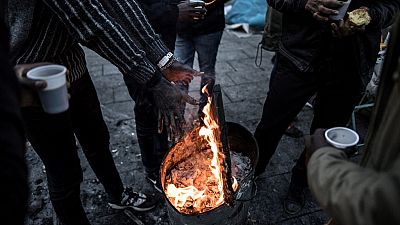France
It's 4:05 a.m., a fluorescent yellow mass rushes onto a night bus in the Paris suburbs. Mohamed Traoré, undocumented, works in the back of a garbage truck. His garbage collector's outfit allows him to get through identity checks: in a few minutes, he must report to the depot.
The 38-year-old Malian, with a goatee and the build of a heavyweight boxer, is one of those workers whose possible regularization has ignited the political debate, since the announcement of an immigration bill including a “occupations in tension” residence permit .
In a decade of clandestinity , Mohamed Traoré has worked in all sectors that recruit without declaring. For three years, he has been a scavenger, attached to the dump truck of a cleaning giant. A temp agency takes him from week to week.
When he gets off the N45 at Bondy (Seine-Saint-Denis), he learns that he will not work this Monday morning in October. Leader's decision. No pay for this day.
“Like their dog”
"When you're undocumented, the bosses take advantage of it, you're like their dog. If they need to use you, they use you. Otherwise, they leave you behind. Either way, you don't have no choice, you're going to come back, you're in their cage" , explains the native of Bamako .
Like many, he works with someone else's papers, in this case an "uncle" . This is called working "under alias" . Does his boss know? “Of course he knows! The uncle is 53 years old, we don’t really look the same ,” he gets exasperated.
The situation would almost amuse him, if it didn't hurt . Mohamed Traoré had "hope" of being regularized in 2020, during the Covid crisis, when the French applauded these "first on duty" .
Obtaining papers would allow him to no longer pay 30% of his salary (between 1,000 and 1,400 euros) to his alias, leave his room paid for 300 euros in an overcrowded shared accommodation , see his family in Mali . In short, to “put an end to the hassle” . His employer doesn't want to hear about it.
Subordination
It is to break this relationship of "subordination" between the employee and the employer that the bill (the parliamentary examination of which is due to begin on November 6) opens up the possibility for an untitled worker to submit their request alone.
It remains to be seen which jobs will be covered by this list of professions currently being revised, observes Jean-Albert Guidou, responsible for the subject at the CGT.
“If the list is restrictive, we would end up with workers who would no longer have any way out, except to change profession,” worries the trade unionist, while 7,000 to 10,000 people are regularized each year by the Valls circular. from 2012.
In Ile-de-France, this workforce represents several hundred thousand people, estimates the CGT.
Electroshock
“We need an electric shock to find a system that regulates things. We need young people who want to do jobs that our fellow citizens no longer want to do,” judges Manuel Heurtier, 65, chef and restaurateur in Montrouge (Hauts-de -Seine).
The man is angry. In 40 years of work, he has seen a summary of the recent history of immigration pass through his kitchens: North Africans, Sri Lankans, Africans ... He has also observed the administrative "gas factory" , the sticks in the wheels of restaurateurs, who nevertheless struggle to hire.
For five years now, he has accompanied the quest for papers from his assistant in the kitchen, Amadou Ba, a 27-year-old Senegalese. “This guy is gold. Punctual, serious, kind ,” sums up the owner of Mendi Gorria, frantically rubbing lemon on his hands and forearms after lunch service.
“If the chef didn’t help me, I would have broken down ,” confides Amadou Ba, hands trembling and covered in burns. Shy, slender in his white kitchen jacket, the Senegalese who started dishwashing five years ago holds a permanent contract and has around sixty pay slips (80 are enough for the procedure). He does n't "understand" why his file was refused or lost three times.
"As long as you don't have the papers, you have no rights: no unemployment, no retirement, no vacation..." he blurted out.
A few weeks ago, majority deputies, gathered in the restaurant, spoke with him. On September 12, this improbable meeting was immortalized in a photo, published by Libération . The prefecture immediately called him: his file was found. Amadou Ba shrugs his shoulders. The kitchens of power...













00:53
Algeria expels over 1,800 migrants to Niger in mass deportation
Go to video
South Sudan to send delegation to the U.S. in a effort to appease tensions
Go to video
Kinshasa reacts to Trump's claim that 'many' Congolese come to US
01:16
Trump sparks backlash after remarking about Congo
00:50
Spain: human trafficking ring smuggling moroccans into europe dismantled
Go to video
Tunisia dismantles encampments housing migrants stranded en route to Europe